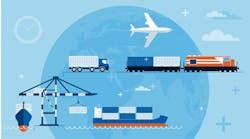As an immutable public ledger that records and verifies that transactions have occurred, blockchain holds a lot of promise in supply chain applications. In an environment where buyers are transacting with global partners on a daily basis, for example, many checks and balances have to be put in place to ensure all of the related data and information is accurate, reliable, and unaltered.
That’s where blockchain comes in. A time-stamped series of immutable record of data that is managed by a cluster of computers not owned by any single entity, blockchain comprises blocks of data that are secured and bound to one other using cryptographic principles.
The Real Value in Blockchain
According to Blockgeeks, blockchain’s real value lies in the fact that its network has no central authority; it is the very definition of a democratized system. “Since it is a shared and immutable ledger, the information in it is open for anyone and everyone to see,” Blockgeeks points out. “Hence, anything that is built on the blockchain is by its very nature transparent and everyone involved is accountable for their actions.”
Blockchain also provides transparency, traceability, and trust—all while removing the need for middlemen and reducing transaction costs. But before blockchain can be a de facto ledger for supply chain transactions, industry standards need to be put in place to ensure compatibility and interoperability.
“Blockchain provides one mechanism for sharing information between supply chain trading partners,” ARC Advisory Group’s Steve Banker points out in “Supply Chain Blockchain Applications Won’t Work Without Data Standards!” “But just as clear thinking depends upon carefully defining terms, effective supply chain collaboration requires a defined vocabulary. Business is just easier when you speak the same language as your customers, suppliers, and partners.”
But First, Standards
To date, not-for-profit standards developer GS1 has led the charge to create and implement blockchain standards. It launched a cross-industry blockchain discussion group last year to help companies better understand the technology and to prepare for implementation using GS1-developed standards, which provide a “foundational data structure and systems interoperability to help drive blockchain success,” the group says.
"With so many diverse use cases being piloted—from improving product recalls to helping companies meet regulatory requirements—industry has determined that blockchain should be examined more closely," GS1’s Siobhan O'Bara said in a press release.
Most recently, GS1 created a set standard to share data known as Electronic Product Code Information Services (EPCIS), according to Banker. This standard allows event data to be shared across enterprises so that users can gain a shared view of inventory (raw materials, work-in-process, and finished goods) as it transitions between process steps across an extended supply chain.
"Leveraging the blockchain expertise and guidance that GS1 US has provided over the last year, this group will help determine a path forward that supports the supply chain's current and future investments in GS1 Standards,” O’Bara said, “and strengthen the progress we've already accomplished in the areas of visibility, traceability, and transparency."
Shipment Visibility
The Blockchain in Transport Alliance (BiTA) is also working on a set of open blockchain standards—a framework that would act as a springboard for companies within the industry to develop blockchain-related applications, according to FreightWaves.
“Logistics processes are no longer within an enterprise or just within a few partners—they now span a whole network of participants across the transportation and supply chain industry,” BiTA’s Ben Kothari told FreightWaves. “And the current systems and standards of these networks were never designed for the scenarios or are quite antiquated to cope.”
BiTA standards will help businesses understand, at a broader level, what the processes look like, the entities that operate within these processes, and the smart contracts or agreements that are built on top of them—helping companies operate without friction in a network, FreightWaves reports.
What’s Ahead?
With the first two blockchain-supply chain initiatives set to go beyond the pilot stage later this year—including a Walmart traceability/recall mandate for green leafy vegetables and a pharma initiative supporting new government regulations surrounding salable returns—Banker says both initiatives will use GS1 standards.
“While some of the proof of concepts will fail,” he concludes, “even these failures can serve a positive purpose if they cast a spotlight on the growing number, and value, of the supply chain standards supported by GS1.”










